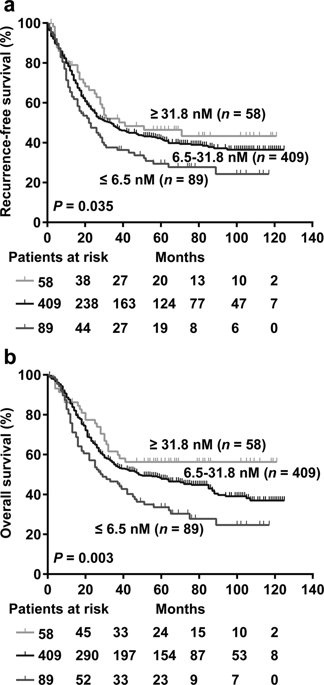当前位置:
X-MOL 学术
›
Eur. J. Clin. Nutr.
›
论文详情
Our official English website, www.x-mol.net, welcomes your feedback! (Note: you will need to create a separate account there.)
Decreased plasma riboflavin is associated with poor prognosis, invasion, and metastasis in esophageal squamous cell carcinoma.
European Journal of Clinical Nutrition ( IF 4.7 ) Pub Date : 2020-02-14 , DOI: 10.1038/s41430-020-0585-8 Feng Pan 1, 2 , Hong-Jun Luo 3 , Zhi-Yong Wu 4 , Su-Zuan Chen 5 , Xuan Wang 1, 6 , Shuai-Xia Yu 1, 6 , Jia-Min Wang 1, 6 , Shu-Yuan Lin 1, 6 , Ze-Ying Cai 1, 6 , Yu-Lin Gao 1, 6 , Pei-Tong Zhuang 1, 2 , Li-Yan Xu 1, 6 , En-Min Li 1, 2
European Journal of Clinical Nutrition ( IF 4.7 ) Pub Date : 2020-02-14 , DOI: 10.1038/s41430-020-0585-8 Feng Pan 1, 2 , Hong-Jun Luo 3 , Zhi-Yong Wu 4 , Su-Zuan Chen 5 , Xuan Wang 1, 6 , Shuai-Xia Yu 1, 6 , Jia-Min Wang 1, 6 , Shu-Yuan Lin 1, 6 , Ze-Ying Cai 1, 6 , Yu-Lin Gao 1, 6 , Pei-Tong Zhuang 1, 2 , Li-Yan Xu 1, 6 , En-Min Li 1, 2
Affiliation

|
BACKGROUND
Riboflavin deficiency confers a predisposition for esophageal cancer. The role of plasma riboflavin levels in development and prognosis of individuals with digestive tract inflammation and ulcer (DTIU), digestive tract polyps (DTPs), and ESCC is not well understood.
METHODS
We performed a cross-sectional study, including 177 DTIU, 80 DTP, and 324 ESCC cases, to measure the plasma riboflavin levels among the three populations. Correlation between plasma riboflavin levels (categorized as ≥31.8, 6.5-31.8 and ≤6.5 nmol/L groups) and clinical characteristics, as well as survival of ESCC patients (556 cases) was analyzed.
RESULTS
There was no difference in plasma riboflavin levels between DTIU, DTP, and ESCC cases (P > 0.05). Plasma riboflavin levels were inversely correlated with invasive depth (correlation coefficient = -0.09, P = 0.026) and lymph node metastasis (correlation coefficient = -0.11, P = 0.010) of ESCC, and ESCC patients with low riboflavin levels had poor recurrence-free survival (P = 0.035) and overall survival (P = 0.003). Decreased riboflavin was a prognostic factor for poor overall survival (HR = 1.91, 95% CI = 1.19-3.07, P = 0.007).
CONCLUSIONS
Plasma riboflavin levels in DTIU, DTP, and ESCC patients are similar. Plasma riboflavin levels are associated with the development and prognosis of ESCC.
中文翻译:

血浆核黄素降低与食管鳞状细胞癌的不良预后,侵袭和转移有关。
背景技术核黄素缺乏赋予食道癌易感性。血浆核黄素水平在具有消化道炎症和溃疡(DTIU),消化道息肉(DTP)和ESCC的个体的发展和预后中的作用尚不清楚。方法我们进行了一项横断面研究,包括177例DTIU,80例DTP和324例ESCC病例,以测量这三个人群的血浆核黄素水平。分析血浆核黄素水平(分类为≥31.8、6.5-31.8和≤6.5nmol/ L组)与临床特征以及ESCC患者(556例)的生存率之间的相关性。结果DTIU,DTP和ESCC患者之间的血浆核黄素水平没有差异(P> 0.05)。血浆核黄素水平与浸润深度呈负相关(相关系数= -0.09,P = 0。026)和ESCC的淋巴结转移(相关系数= -0.11,P = 0.010),以及核黄素水平低的ESCC患者的无复发生存率(P = 0.035)和总生存率(P = 0.003)。核黄素降低是整体生存不良的预后因素(HR = 1.91,95%CI = 1.19-3.07,P = 0.007)。结论DTIU,DTP和ESCC患者的血浆核黄素水平相似。血浆核黄素水平与ESCC的发生和预后有关。DTP和ESCC患者相似。血浆核黄素水平与ESCC的发生和预后有关。DTP和ESCC患者相似。血浆核黄素水平与ESCC的发生和预后有关。
更新日期:2020-02-14
中文翻译:

血浆核黄素降低与食管鳞状细胞癌的不良预后,侵袭和转移有关。
背景技术核黄素缺乏赋予食道癌易感性。血浆核黄素水平在具有消化道炎症和溃疡(DTIU),消化道息肉(DTP)和ESCC的个体的发展和预后中的作用尚不清楚。方法我们进行了一项横断面研究,包括177例DTIU,80例DTP和324例ESCC病例,以测量这三个人群的血浆核黄素水平。分析血浆核黄素水平(分类为≥31.8、6.5-31.8和≤6.5nmol/ L组)与临床特征以及ESCC患者(556例)的生存率之间的相关性。结果DTIU,DTP和ESCC患者之间的血浆核黄素水平没有差异(P> 0.05)。血浆核黄素水平与浸润深度呈负相关(相关系数= -0.09,P = 0。026)和ESCC的淋巴结转移(相关系数= -0.11,P = 0.010),以及核黄素水平低的ESCC患者的无复发生存率(P = 0.035)和总生存率(P = 0.003)。核黄素降低是整体生存不良的预后因素(HR = 1.91,95%CI = 1.19-3.07,P = 0.007)。结论DTIU,DTP和ESCC患者的血浆核黄素水平相似。血浆核黄素水平与ESCC的发生和预后有关。DTP和ESCC患者相似。血浆核黄素水平与ESCC的发生和预后有关。DTP和ESCC患者相似。血浆核黄素水平与ESCC的发生和预后有关。



























 京公网安备 11010802027423号
京公网安备 11010802027423号